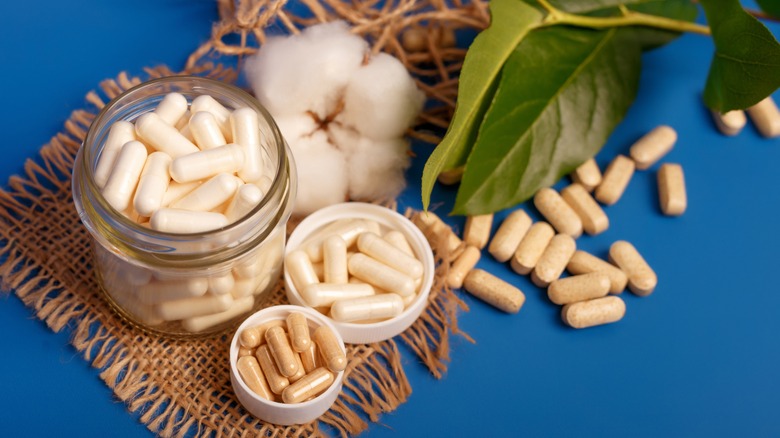You Should Stop Taking Probiotic Supplements If This Happens To You
Probiotic supplements are a popular way to improve gut health and balance the good bacteria in your body. Overall, they have been found to be safe to take for long periods of time and discontinue abruptly if necessary in recent studies (via Dr. Ruscio DNM, DC). While most people probably don't need to take a probiotic supplement, they can benefit those looking to improve their gut health. "No one I know has the perfect microbiome, and I personally check a lot of patients," integrative physician Bindiya Gandhi, MD, told Mindbodygreen. "No one eats perfectly all the time: eating fermented foods, fiber, prebiotic foods, vegetables, and fruits. That's why I highly recommend everyone of all ages take a daily probiotic for generalized overall health."
However, probiotics aren't right for everyone. According to Livestrong, some people with health conditions or compromised immune systems can experience serious side effects like infections when taking probiotics. Taking a high dosage of probiotics for a long period of time can also cause you to become immune to some antibiotics in the future. Pay attention to how you feel after you begin taking this supplement. If you notice any uncomfortable or concerning symptoms, stop taking the supplement and speak with your doctor.
What probiotics can and can't do for you
Probiotics can offer some health benefits to certain people by supporting healthy bacteria growth in the gut. They can be especially helpful for people with gut health issues like IBS, frequent bloating, or nausea after eating (via Healthline). In addition to better digestion, probiotics may help to prevent yeast and urinary tract infections as well (via WebMD). They may also help with eczema, acne, infections, allergies, and asthma in some people. However, research on their ability to treat these conditions is mostly anecdotal and still ongoing.
However, it is important to know that probiotics aren't a cure-all supplement. According to the National Center for Complementary and Integrative Health (NCCIH), "in most instances, we still don't know which probiotics are helpful and which are not. We also don't know how much of the probiotic people would have to take or who would be most likely to benefit. Even for the conditions that have been studied the most, researchers are still working toward finding the answers to these questions." You shouldn't rely exclusively on probiotics to improve your gut health. You should try to get probiotics naturally through foods like yogurt, kefir, sauerkraut, tempeh, and kimchi.


